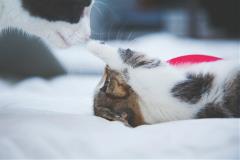Newborn Kittens: When a Mother’s Milk Makes Them Ill

Kittens are susceptible to many diseases, but some are more vulnerable than others because of factors that can affect them through their mother’s milk.
Ways a Mother’s Milk Can Make a Kitten Sick
Neonatal Isoerythrolysis
Neonatal Isoerythrolysis, also referred to as hemolytic anemia, is one of the most common causes of anemia found in newborns. Most prevalent in pedigreed kittens, it occurs in higher numbers in British Shorthairs, Exotics, and the Rex breeds.
Cats have three different blood types, A, B, and AB, with the highest number of cats placed in the type A group. Hemolytic anemia occurs when the breeding female and male have different blood types.
- For instance, if a female type B is bred to a male type A, and the result is a kitten type A, the kitten may be exposed to type A antibodies and become affected by neonatal isoerythrolysis through the mother’s milk
- The condition begins as the kitten takes its first feeding of colostrum, which exposes them to the type A antibodies
- Once ingested, the antibodies found in the colostrum begin to sicken the kitten by destroying its red blood cells
- Symptoms appear quickly, within hours to a few days, and include:
- Kitten will appear:
- Jaundiced
- Weakened
- Seem to fade away
- Urine will be dark, red, and contain hemoglobin
- Death will occur, within 24 hours to a few days
- In some cases, the only symptoms that a kitten will exhibit is tissue death at the tip of its tail
- Treatment requires immediate attention as the kitten’s life is already at risk by the time the signs are noticed
- If suspected, any future nursing must be prevented by removing the kitten from its mother
- Kitten may require blood transfusions
- Prognosis is not positive, many will not survive
- To prevent the condition from happening, blood or DNA tests from the intended breeding pair should be used to determine if their blood types are compatible before mating occurs.
Iron Deficiency Anemia
While not a common cause in kittens, iron deficiency anemia in newborns can be attributed to an anemic queen whose milk contains a low iron content.
- Symptoms include:
- Undersized kittens
- Slow growth
- Excessive fatigue
- Pale mucous membranes
- Diagnosis and Treatment:
- Veterinary examination and tests will need to be completed to determine the exact cause
- Fast response is obtainable through iron and vitamin supplements of both queen and kittens
To note: iron deficiency anemia most commonly occurs in older kittens and adults that are found to have:
- Intestinal parasites that cause blood loss in the gastrointestinal tract
- External parasites that feed on blood
Toxic Milk Syndrome
Usually found to affect kittens by 1 to 2 weeks of age, the causes of toxic milk syndrome may include:
- Acute septic mastitis
- When mammary gland becomes infected with bacteria, the milk becomes toxic to kittens causing septicemia and/or sudden death
- Acute metritis
- Occurs as a result of a bacterial infection of the lining of the uterus obtained during the time of or right after birthing
- A life-threatening condition, if queen becomes toxic, the milk will be toxic
- Kittens will need to be taken off mother
- Kitten formula that has been:
- Either improperly prepared or stored, and that has been contaminated with bacteria
- Symptoms in kittens include:
- Continuous crying
- Diarrhea, which often makes the anus red and swollen
- Bloating
Kitten Septicemia
Bacteria from contaminated milk can also cause a blood-borne infection called kitten septicemia that is found to occur in kittens typically less than 2 weeks of age.
- Bacteria from contaminated milk will penetrate the intestinal wall lining and enter into the bloodstream
- Symptoms will be similar to toxic milk syndrome, and will also include:
- Straining to defecate
- Distended abdomen that is tinted dark red or blue, indicating peritonitis
- Refusal to nurse
- Continued weakening signs, such as: dehydration, weight loss, chilling
- Many die within their first week of life
- Treatment requires veterinary care to determine the cause, and kittens:
- Will need treatment for symptoms and require antibiotics
- Should be prevented from nursing from queen
When newborn kittens fail to thrive, remind clients that it is essential to watch for any indication that the cause of their condition may be from their mother’s milk.
Please contact your Covetrus representative at 855.724.3461 for additional information on kitten health.
Source:
Cat Owner’s Home Veterinary Handbook, 3rd ed., D.M. Eldredge, D.G. Carlson, L.D. Carlson, J.M. Giffin
Careers
Are you looking for a place to let your talents shine? At Covetrus, we help our practitioner customers better serve their patients and take pride in providing the best customer experience possible. Search our open positions to see our available opportunities.
Newsletter
Stay current with what’s going on with Covetrus, subscribe to receive our newsletter and email communications. Subscribers will receive the latest information in practice management, sales and marketing, animal health, and more.


Leave a comment